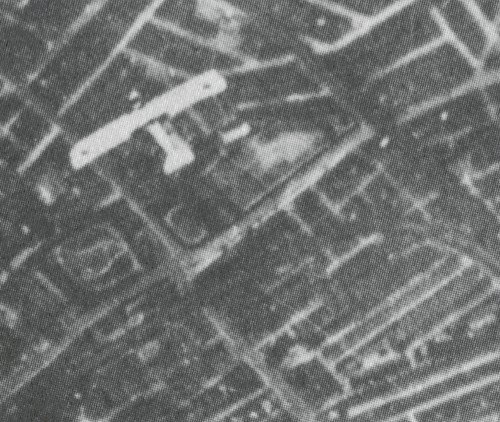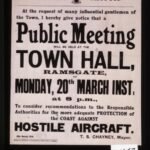
You might think that the first Blitz was the Blitz, i.e. the German bombing of British cities in 1940-1941, at the time was understood as a form of blitzkrieg, which was then shortened to ‘blitz’ or ‘Blitz’. Of course, that doesn’t mean a blitz couldn’t be retrospectively recognised, and indeed it was soon applied, for example, to earlier events such as the ‘Rotterdam Blitz’ on 14 May 1940.1 Much more recently, there has been a vogue for the term among historians writing on the German air raids on British cities in 1914-1918, variously the ‘First Blitz’, the ‘Zeppelin Blitz’ or the ‘Forgotten Blitz’. Check it out:
- Andrew P. Hyde, The First Blitz: The German Air Campaign against Britain 1917–1918 (Barnsley: Leo Cooper, 2002).
- Neil Faulkner and Nadia Durrani, In Search of the Zeppelin War: The Archaeology of the First Blitz (Stroud: Tempus, 2008).
- Neil Hanson, First Blitz: The Secret German Plan to Raze London to the Ground in 1918 (London: Doubleday, 2008).
- Ian Castle, The First Blitz: Bombing London in the First World War (Oxford: Osprey, 2015).
- Neil Storey, Zeppelin Blitz: The German Air Raids on Great Britain during the First World War (Stroud: History Press, 2015).
- Ian Castle, Zeppelin Onslaught: The Forgotten Blitz 1914–1915 (Barnsley: Frontline, 2018).
- Ian Castle, The First Blitz in 100 Objects (Philadelphia: Frontline Books, 2019).
- Ian Castle, Zeppelin Inferno: The Forgotten Blitz 1916 (Philadelphia: Frontline, 2022).((There’s also a journal article: Paul Fantom, ‘Zeppelins over the Black Country: The Midlands’ first blitz’, Midland History 39, no. 2 (2014): 236–254.))
Even discounting the fact that four of those books are from the one author, this is starting to look like a consensus.2
And why not? Many aspects of the 1940-41 raids were prefigured in 1914-18, from the bleeding obvious stuff (aircraft flying over and dropping bombs on British cities), to the ways in which the British government responded to this threat (air defence, civil defence, air offence), to the ideal emotional response on the part of civilians (British pluck, the Blitz spirit). And I can tell you from personal experience how annoying it gets to keep writing some cumbersome variation on ‘the German raids on Britain in 1914-18’ or ‘the First World War air raids’ or ‘the Zeppelin and Gotha offensive’, etc!
But as you can probably guess, despite my longing for a convenient shorthand I’m not fully sold on the First Blitz.3 This is partly because of the ways in which the British experience of bombing in 1914-18 was significantly different to that in 1940-41. It’s also because I think that one of the key works on the above list -– the most popular one, Neil Hanson’s First Blitz — is quite problematic. But I’m not sure how sensible my objections are: analogies don’t have to be exact to be useful, after all. So I’m going to post through my confusion and work out if I should learn to stop worrying and love the First Blitz.
Image source: Fredette, The Sky on Fire.
![]() This work is licensed under a Creative Commons Attribution-NonCommercial-NoDerivatives 4.0 International License.
Permissions beyond the scope of this license may be available at http://airminded.org/copyright/.
This work is licensed under a Creative Commons Attribution-NonCommercial-NoDerivatives 4.0 International License.
Permissions beyond the scope of this license may be available at http://airminded.org/copyright/.
- In fact the term ‘blitz’ in the sense of air raids does seem to have slightly preceded the Blitz proper, judging from BNA, but only by a few days or weeks. [↩]
- Compare with the other ‘first’ contender, the ‘First Battle of Britain’. There’s only one book I know of with this in the title: Raymond H. Fredette, The Sky on Fire: The First Battle of Britain 1917–1918 and the Birth of the Royal Air Force (Washington, D.C.: Smithsonian Institution Press, 1991). As that was first published more than half a century ago, it doesn’t seem like it’s going to catch on. [↩]
- It’s not in the working title of my next book, currently Home Fires Burning: Britain’s First War from the Air, 1914–1918, though admittedly this is not entirely stable from draft to draft! [↩]




![The First Blitz? – III German propaganda poster with a vibrant and striking image depicting swarms of British aircraft bombing an industrial site to illustrate the following quote, by British Labour Leader Johnston Hicks [sic], which appeared in the 'Daily Telegraph' on January 3rd 1918: 'One must bomb the Rhineland industrial regions with one hundred aircraft day after day, until the treatment has had its effect!’](https://airminded.org/wp-content/uploads/2024/03/artv05099-150x150.jpg)